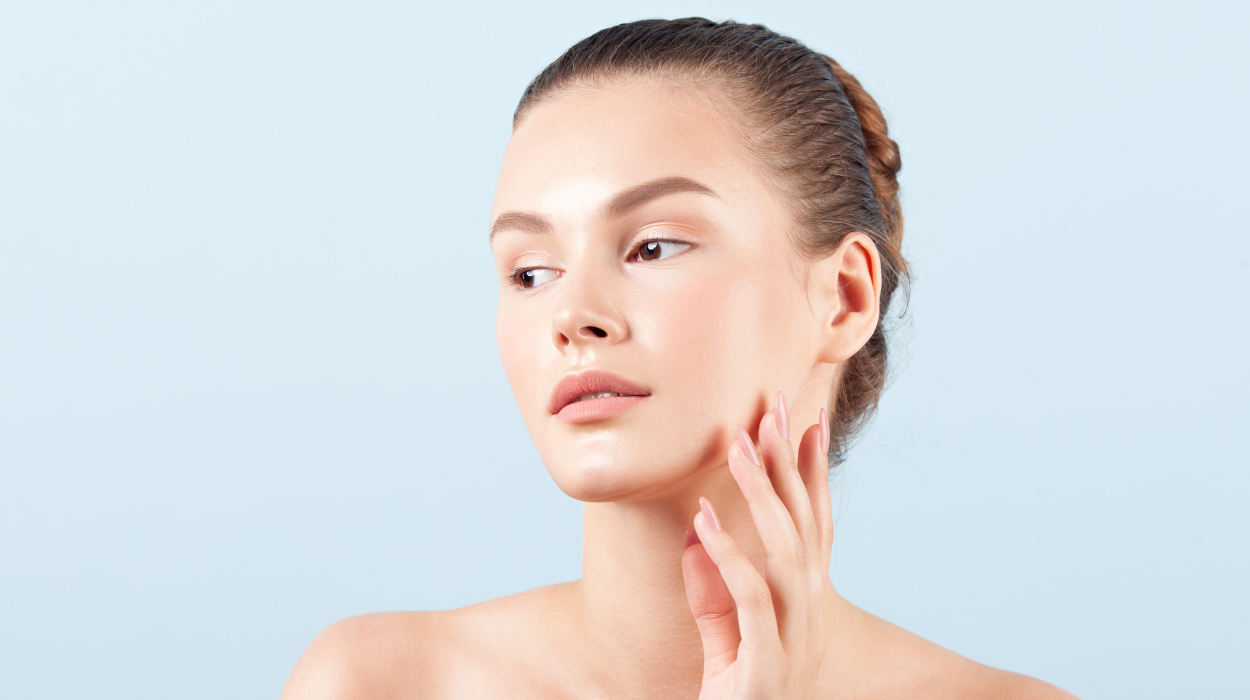Grapefruit has gotten a bad rap in the past. Many think of it as a sour, bitter diet fruit. But it’s so much more than that.
Grapefruit can be enjoyed any time for total body health — not just for dieting. It can boost your skin health, immune function, and even your digestion. It’s full of antioxidants, vitamin C, and water to keep you hydrated and energized.
When it comes to your skin, grapefruit can enhance your skin texture and boost your collagen production. That means smoother, plumper, and firmer-looking skin.
Read on to learn grapefruit benefits for the skin, including ways to enjoy eating it daily.
Which Benefits Grapefruit May Bring To Your Skin?
- Antioxidant protection.
- Boosted collagen production.
- Reduced inflammation.
- Acne-fighting properties.
- Brightened skin.
- Hydrate skin.
Benefits Of Grapefruit For Skin
Grapefruit isn’t just a refreshing summer treat; it’s a skincare powerhouse. Packed with essential nutrients and bioactive compounds, it helps your skin look its best. Here are some of the benefits of grapefruit:
Antioxidant Protection

Grapefruit is a rich source of antioxidants,[1] with vitamin C being the most famous. It protects the skin from oxidative stress caused by free radicals.
Free radicals[2] are unstable chemicals that can cause damage at the cellular level. This can accelerate aging, leading to health issues as well as wrinkles, fine lines, and a dull complexion. Fortunately, a diet and skincare routine rich in antioxidants[3] can combat this process.
Boosted Collagen Production
Collagen[4] is what maintains your skin’s elasticity and firmness. It’s the structural foundation of your skin. Its fibers form a network, providing structure and support to your skin cells.
As we age, our collagen production[5] naturally decreases, leading to wrinkles and sagging skin.
Fortunately, grapefruit, with its high vitamin C content,[6] works to boost collagen synthesis. Vitamin C helps to stabilize and create collagen[4] molecules.
Plus, vitamin C works as a co-factor for the enzymes that convert amino acids lysine and proline into the building blocks for collagen. So regular intake of vitamin C can help your body produce enough to help maintain resilient skin.
Reduced Inflammation
If you’re prone to inflammatory skin conditions,[7] like acne, eczema, and rosacea, grapefruit is the fruit for you. Its flavonoids can help reduce inflammation and redness in the skin. These compounds work to inhibit certain enzymes that cause inflammatory responses.
Acne-Fighting Properties
Grapefruit’s health benefits also include its antimicrobial properties. When combined with its anti-inflammatory actions, this citrus fruit can reduce acne breakouts. In particular, grapefruit seed extract can be highly antimicrobial.[8] It works to benefit you both by consuming grapefruit[9] and using it topically.[10]
Its natural acidity from citric acid and salicylic acid can work to balance the skin’s pH levels.[11] This works to manage oily and acne-prone skin types since imbalanced pH levels can lead to excess oil production and clogged pores — both of which are common culprits in acne formation.
Brightened Skin

Grapefruit is a natural skin brightener[12] thanks to its help in reducing spots. Its citric acid also acts as a mild exfoliant,[13] helping to gently remove dead skin cells from the surface. This can reveal brighter, more radiant, healthy skin underneath.
Exfoliating also helps to reduce the appearance of dark spots and hyperpigmentation, creating a more even skin tone.
Hydrated Skin
Hydration is key for total body health, including plump and youthful-looking skin.[14]
Grapefruit has a high water content, making it the perfect fruit for hydration. Its hydrating properties also maintain your skin’s natural moisture barrier, which can prevent dryness and dehydration. So if you have dry or flaky skin, water-rich fruits and veggies are a great choice for you.
Surprisingly, grapefruit[15] also has essential fatty acids[16] and phytonutrients that help lock moisture in the skin. They strengthen your skin’s barrier function[17] and help protect it from environmental stressors that cause moisture loss, like the sun or a dry environment.
Is Grapefruit Good For Your Skin?
Yes, grapefruit is good for your skin. It has a high content of vitamins, antioxidants, and hydrating properties to help prevent dry, dull, acne-prone, or aging skin.
You could take the best green powders and other fruit and vegetable supplements and powders, but getting nutrients from the whole food source is often best. Nutrients are usually most bioavailable when eaten directly, and more filling, too.
Why Is Grapefruit Good For Your Skin?
One of the main reasons why grapefruit is good for your skin is because it has high levels of vitamin C.[4] You’ll even find this vitamin added into most of the hundred skin-care products lining the shelves at a pharmacy or beauty shop.
Vitamin C is famous for skin health thanks to its role in collagen synthesis — the protein that gives skin its elasticity and firmness. Since we naturally produce less as we age, we need to make sure we get enough from our diet. If not, sagging skin, wrinkles, and other potential health issues are more likely to develop.
Vitamin C is also a powerful antioxidant that fights damage caused by stressors like UV rays, pollution, smoking, or a poor diet.
Finally, vitamin C can even help brighten your skin and reduce pigmentation. It inhibits the enzyme responsible for melanin production,[12] which can create dark spots and an uneven skin tone. Plus, its other compounds like flavonoids, beta-carotene, and lycopene are anti-inflammatory and can soothe irritated skin and reduce redness.
Ways To Use Grapefruit For Better Skin Health
Grapefruit’s rich blend of vitamins, antioxidants, and natural acids makes it the perfect fruit for healthier, more radiant skin. Here are some of the ways to add it to your skincare routine:
Topical Face Mask
To create a grapefruit face mask, squeeze half a grapefruit or buy fresh grapefruit juice for your base. Then, add well-known natural ingredients to be great for the skin. For example, honey[18] has antibacterial properties and yogurt[19] has a soothing effect.
Apply the mixture to your face and leave it on for 10 to 15 minutes before rinsing with warm water.
The citric acid is a gentle exfoliant,[20] removing dead skin cells and promoting new cell growth. Regularly using a grapefruit mask may work to reduce dark spots, even out your skin tone, and give you a natural glow.
As A Toner
Grapefruit’s astringent properties work to tighten pores and reduce excess oil. This makes it perfect for people with oily or acne-prone skin.
To create a grapefruit toner, mix equal parts of grapefruit juice with witch hazel,[21] a natural ingredient known for its skin-soothing properties. Apply it to your face with a cotton ball after cleansing.
This toner can help balance your skin’s pH levels, reducing inflammation while offering a refreshing and rejuvenating effect.
Part Of Your Diet
Grapefruit works to make your skin healthier not just by applying it topically, but — like any healthy anti-oxidant-rich food — by eating it, too. From the inside out, grapefruit can reduce the signs of aging and help prevent health conditions.[22]
Its high water content also works to keep your skin plump and hydrated. Plus, its dietary fiber aids digestion and detoxification,[23] which can also lead to healthier skin. Finally, fruits low in sugar can help to prevent insulin resistance. That means they can also help to reduce sugar cravings, and sugary foods can cause more skin issues.
How To Add More Grapefruit To Your Diet
Think of grapefruit like an orange, you can peel and it eat fresh or add half a grapefruit to salads or as toppings for main dishes.
Otherwise, try adding grapefruit extract to different meals and desserts. You can even add grapefruit oil or grapefruit extract to your morning tea, water, detox juice, or smoothie.
The Bottom Line
Citrus fruits are much more than a low-sugar diet food. They’re rich in antioxidants and work to protect your skin from stressors like pollution, UV rays, poor diet, and smoking.
Grapefruit is famous in skincare products thanks to its high vitamin C content, which is essential for collagen production. Collagen is the protein behind your skin’s firmness and plumpness, but it naturally declines as you age. That’s why a diet and skincare regimen rich in vitamin C can help you reduce the signs of aging.
It’s also anti-inflammatory and can reduce symptoms of sensitive skin conditions like eczema, acne, and rosacea. Internally, it works to improve your digestion, immune system, and energy levels. It’s truly the fruit that doesn’t stop giving.
Add it to your salads and meals, and even consider it as a dessert. With time, you’ll notice its sweetness much more than its bitterness — especially as you see how grapefruit benefits your skin.
Frequently Asked Questions
Grapefruit can brighten, hydrate, and offer antioxidant protection for your face.
Yes, the vitamin C in grapefruit is used in collagen production, which helps maintain skin elasticity.
Grapefruit’s vitamin C can help collagen production, which can lead to tighter, firmer skin.
Grapefruit is especially great for the liver[24] because it aids in detoxification and metabolism.
Eating grapefruit provides antioxidants and hydration, which can help your skin look firm and healthy.
Eating grapefruit regularly can work to improve your skin health, digestion, and immune function.
Like many fruits and vegetables, grapefruit’s anti-inflammatory and antimicrobial properties might help reduce acne. Regular exercise, sleep, stress management, and a diet low in processed foods and sugars can also lead to better skin.
 Evidence Based
Evidence Based
